Related Research Articles
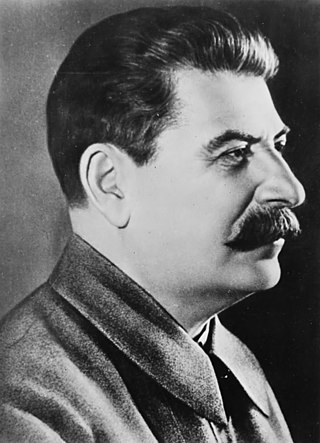
Totalitarianism is a political system and a form of government that prohibits opposition political parties, disregards and outlaws the political claims of individual and group opposition to the state, and completely controls the public sphere and the private sphere of society. In the field of political science, totalitarianism is the extreme form of authoritarianism, wherein all socio-political power is held by a dictator, who also controls the national politics and the peoples of the nation with continual propaganda campaigns that are broadcast by state-controlled and by friendly private mass communications media.
Soviet anti-Zionism is an anti-Zionist and pro-Arab doctrine promulgated in the Soviet Union during the Cold War. While the Soviet Union initially pursued a pro-Zionist policy after World War II due to its perception that the Jewish state would be socialist and pro-Soviet, its outlook on the Arab–Israeli conflict changed as Israel began to develop a close relationship with the United States and aligned itself with the Western Bloc.

In political science, rollback is the strategy of forcing a change in the major policies of a state, usually by replacing its ruling regime. It contrasts with containment, which means preventing the expansion of that state; and with détente, which means developing a working relationship with that state. Most of the discussions of rollback in the scholarly literature deal with United States foreign policy toward communist countries during the Cold War. The rollback strategy was tried and was not successful in Korea in 1950 and in Cuba in 1961, but it was successful in Grenada in 1983. The United States discussed the use of rollback during the East German uprising of 1953 and the Hungarian Revolution of 1956, which were ultimately crushed by the Soviet Army, but decided against it to avoid the risk of a major war.

The World Peace Council (WPC) is an international organization created in 1949 by the Cominform and propped up by the Soviet Union. Throughout the Cold War, WPC engaged in propaganda efforts on behalf of the Soviet Union, whereby it criticized the United States and its allies while defending the Soviet Union's involvement in numerous conflicts.
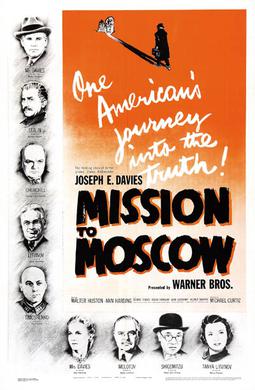
Mission to Moscow is a 1943 propaganda film directed by Michael Curtiz, based on the 1941 book by the former U.S. ambassador to the Soviet Union, Joseph E. Davies.

Communist propaganda is the artistic and social promotion of the ideology of communism, communist worldview, communist society, and interests of the communist movement. While it tends to carry a negative connotation in the Western world, the term propaganda broadly refers to any publication or campaign aimed at promoting a cause and is/was used for official purposes by most communist-oriented governments. The term may also refer to political parties' opponents' campaign. Rooted in Marxist thought, the propaganda of communism is viewed by its proponents as the vehicle for spreading their idea of enlightenment of working class people and pulling them away from the propaganda of who they view to be their oppressors, that they claim reinforces exploitation, such as religion or consumerism. Communist propaganda therefore stands in opposition to bourgeois or capitalist propaganda.
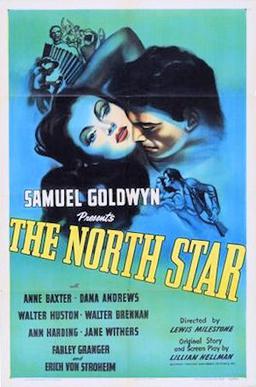
The North Star is a 1943 pro-resistance war film starring Anne Baxter, Dana Andrews, Walter Huston, Walter Brennan and Erich von Stroheim It was produced by Samuel Goldwyn Productions and distributed by RKO Radio Pictures. It was directed by Lewis Milestone, written by Lillian Hellman and featured production design by William Cameron Menzies. The music was written by Aaron Copland, the lyrics by Ira Gershwin, and the cinematography by James Wong Howe. The film also marked the debut of Farley Granger.
Jewish Bolshevism, also Judeo–Bolshevism, is an antisemitic and anti-communist conspiracy theory that claims that the Russian Revolution of 1917 was a Jewish plot and that Jews controlled the Soviet Union and international communist movements, often in furtherance of a plan to destroy Western civilization. It was one of the main Nazi beliefs that served as an ideological justification for the German invasion of the Soviet Union and the Holocaust.
![<i>The Soviet Paradise</i> 1941 [[Nazi Germany]] film](https://upload.wikimedia.org/wikipedia/commons/thumb/f/f6/Soviet_Paradise_exhibition_1942_in_Berlin.jpg/320px-Soviet_Paradise_exhibition_1942_in_Berlin.jpg)
The Soviet Paradise was the name of an exhibition and a propaganda film created by the Department of Film of the propaganda organisation (Reichspropagandaleitung) of the German Nazi Party (NSDAP), and was displayed in the larger cities of the Reich and occupied countries: Vienna, Prague, Berlin and others. Its goal was to show "poverty, misery, depravity and need" of the nations in the Soviet Union under "Jewish Bolshevist" rule and thus to justify the war against the Soviet Union. The accompanying guide for the exhibition noted, "The present Soviet state is nothing other than the realization of that Jewish invention".
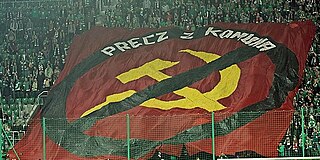
Anti-communism is political and ideological opposition to communist beliefs, groups, and individuals. Organized anti-communism developed after the 1917 October Revolution in Russia, and it reached global dimensions during the Cold War, when the United States and the Soviet Union engaged in an intense rivalry. Anti-communism has been an element of many movements and different political positions across the political spectrum, including anarchism, centrism, conservatism, fascism, liberalism, nationalism, social democracy, socialism, leftism, and libertarianism, as well as broad movements resisting communist governance. Anti-communism has also been expressed by several religious groups, and in art and literature.
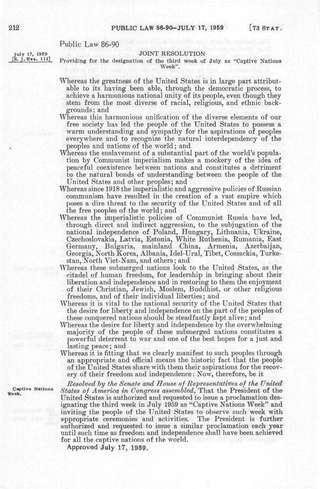
"Captive Nations" is a term that arose in the United States to describe nations under undemocratic regimes. During the Cold War, when the phrase appeared, it referred to nations under Communist administration, primarily Soviet rule.
Paix et Liberté was an anti-communist movement that operated in France during the 1950s.

Nazi propaganda towards the United Kingdom changed its position over time in keeping with Anglo-German relations. Prior to 1938, as the Nazi regime attempted to court the British into an alliance, Nazi propaganda praised the "Aryan" character of the British people and the British Empire. However, as Anglo-German relations deteriorated, and the Second World War broke out, Nazi propaganda vilified the British as oppressive German-hating plutocrats. During the war, it accused "perfidious Albion" of war crimes and sought to drive a wedge between Britain and France.

The Crusade for Freedom was an American propaganda campaign operating from 1950–1960. Its public goal was to raise funds for Radio Free Europe; it also served to conceal the CIA's funding of Radio Free Europe and to generate domestic support for American Cold War policies.
A communist front is a political organization identified as a front organization, allied with or under the effective control of a communist party, the Communist International or other communist organizations. It is a structure used by Communist and left-wing parties to intervene in broader political movements. They attracted politicized individuals who were not party members but who often followed the party line and were called fellow travellers.

Political warfare is the use of hostile political means to compel an opponent to do one's will. The term political describes the calculated interaction between a government and a target audience, including another state's government, military, and/or general population. Governments use a variety of techniques to coerce certain actions, thereby gaining relative advantage over an opponent. The techniques include propaganda and psychological operations ("PsyOps"), which service national and military objectives respectively. Propaganda has many aspects and a hostile and coercive political purpose. Psychological operations are for strategic and tactical military objectives and may be intended for hostile military and civilian populations.

Propaganda is a form of communication that aims to shape people's beliefs, actions and behaviours. It is generally not impartial, and is hence viewed as a means of persuasion. It is often biased, misleading, or even false to promote a specific agenda or perspective. Propagandists use various techniques to manipulate people's opinions, including selective presentation of facts, the omission of relevant information, and the use of emotionally charged language. Propaganda has been widely used throughout history for largely financial, military as well as political purposes, with mixed outcomes.
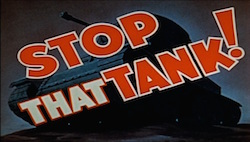
Stop That Tank! is a 22-minute 1942 instructional film created during World War II by Walt Disney Productions for the Directorate of Military Training, The Department of National Defence and the National Film Board of Canada (NFB). Its purpose, akin to "edutainment", was to instruct Canadian soldiers in the handling and care of the Boys Mk.1 Anti-tank rifle for use in combat against Nazi tanks. The film presented information in an entertaining manner as well as providing an anti-Nazi propaganda message.

Communist symbols have been banned, in part or in whole, by a number of the world's countries. As part of a broader process of decommunization, these bans have mostly been proposed or implemented in countries that belonged to the Eastern Bloc during the Cold War, including some post-Soviet states. In some countries, the bans also extend to prohibit the propagation of communism in any form, with varying punishments applied to violators. Though the bans imposed by these countries nominally target the communist ideology, they may be accompanied by popular anti-leftist sentiment and therefore a de facto ban on all leftist philosophies, such as socialism, while not explicitly passing legislation to ban them.
Šluota was a Lithuanian satire and humour magazine which was published, with hiatuses, from 1934 to 2004. Until 1990, it was published by the Communist Party of Lithuania and contained mainly Communist propaganda. It was the only humour magazine in the Lithuanian SSR and it was popular and well received. According to research of Neringa Klumbytė, artists and writers attempted to subvert the Communist ideology using the Aesopian language in the 1970s and 1980s.
References
- ↑ "Archived copy". a6.idata.over-blog.com. Archived from the original on 15 July 2011. Retrieved 20 July 2022.
{{cite web}}: CS1 maint: archived copy as title (link) - ↑ Radio Free Europe’s “Crusade for Freedom”: Rallying Americans Behind ... 0786462078 Richard H. Cummings - 2010 - Hostile and negative reactions to Operation Focus by the Communist regimes in Czechoslovakia and Hungary were also ... Crusade President William A. Greene announced that a 121⁄2 minute film “The Big Lie” was being distributed to ..